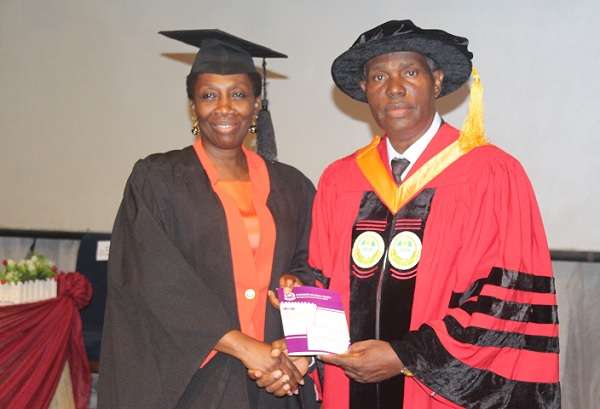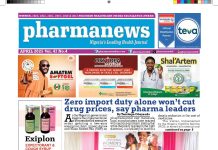
A Professor of Pharmacy Management at the University of Lagos, Professor Emmanuel Nwanolue Anyika, has called on pharmacists and other healthcare professionals in the country to acquire sufficient knowledge that will enable them to minimise errors in healthcare delivery.
Anyika, whose areas of research interest also include pharmacy practice and pharmacotherapeutics made the call recently, while delivering the 2021/2022 inaugural lecture series of the University of Lagos.
Speaking on “Navigating the Pharmaceutical and Management Sciences in Our World of Healthcare Uncertainty”, Ayika evaluated the uncertainties and outcomes arising from prescribing, dispensing, and medication administration errors in the Nigerian healthcare system.
The erudite don noted that probability is one of the sources of uncertainty in healthcare, which is the indeterminacy of future outcomes. He averred that clinical uncertainty could arise from the health professional’s medical knowledge, policy limitations, and/ or cognitive and effective functioning.
Ambiguity, according to Anyika, is another source of uncertainty in healthcare, and this has to do with lack of evidence or contested evidence. While noting that complexity is an aspect of multiplicity of causal factors, he added that uncertainty could arise from how individuals interact and form relationships, such as clinician to patient, clinician to clinician, clinician to pharmacist, and pharmacist to patient.
He explained further that uncertainty could also be a problem resulting from living within complex adaptive systems, where varying mixes of natural and man-made systems interact and resist control.
While assessing prescription-related uncertainty, the professor discussed his research team’s study which assessed “Prescribing Errors and Uncertainty”, focusing on coping strategies of physicians and pharmacists at a university teaching hospital, where they used doctors and pharmacists who experienced prescribing errors and uncertainty.
According to him, while 35.1 per cent of doctors and 40 percent of pharmacists used in the study admitted to having committed medication errors, none disclosed to the patients that they had committed or noticed errors. He, therefore, called for quality organisational culture and structure to foster a care process that is less prone to prescribing errors and uncertainty.
Anyika also referenced another study, “Dispensing Errors (DE) and Uncertainty: Perspectives of Pharmacists in a Tertiary Health Facility in Lagos”, in which his team’s data analyses showed human-based, human-system-based and system-based or structural dimensions that would aggravate dispensing errors and uncertainty. Their findings led to the conclusion that pharmacists, pharmacy technicians, and nurses need continuous training to minimise dispensing errors.
According to him, “Multiple regression analyses show that two errors have a more direct effect on healthcare uncertainty; and both types of errors have the greatest direct effect on pharmaceutical care”.
Anyika also delved into regulatory uncertainty with a study, titled “Regulatory Uncertainties (RU) in the Pharmaceutical Sector: Perceptions Among Nigerian Pharmacists and Policy Implications for Decision Making”. The study, he noted, was carried out to assess pharmacy chief executives’ understanding of regulatory and environmental complexities in different practice areas, their policy choices, and decision-making.
Regarding his findings, the pharmacy management professor remarked, “Majority said that inadequate legislative control and regulatory uncertainties will increase business risks and cause varied enforcement decisions. They also recognised the role of politics in the outcomes in the pharmaceutical sector.”
In a subsequent interview with Pharmanews, Anyika urged pharmacists to be customer-focused so that patients will feel their impact better.
He said, “Uncertainty involves everything we do in life but the most important thing is to keep it down to the barest minimum and to be able to do this, you must be very knowledgeable. It is when you are knowledgeable that you will carry out activities in a more purified and certain manner, thereby minimising the probability of errors in all that you do.
“The government should be conscious of the fact that there is high-level manpower in the country. Unfortunately, the government is not tapping into it. We don’t need to be importing drugs, year in, year out, when we have the manpower. There are competent pharmacists, and we have the industry. We can supply the whole of West Africa if we harness our resources and manpower.”
The professor, who took his time to show the fusion of pharmaceutical and management sciences, also established how management sciences influence the thought processes of a healthcare professional. He noted that there is an urgent need for the application of management principles in all pharmacy practice areas.
While reacting to the lecture, the Vice-Chancellor, University of Lagos, Professor Folasade Ogunsola, described Anyika as an all-around pharmacist who is grounded in all aspects of Pharmacy and business management.
She also lauded his presentation, saying he had evaluated the uncertainties arising from prescribing, dispensing, and medication administration errors in the nation’s healthcare system.










